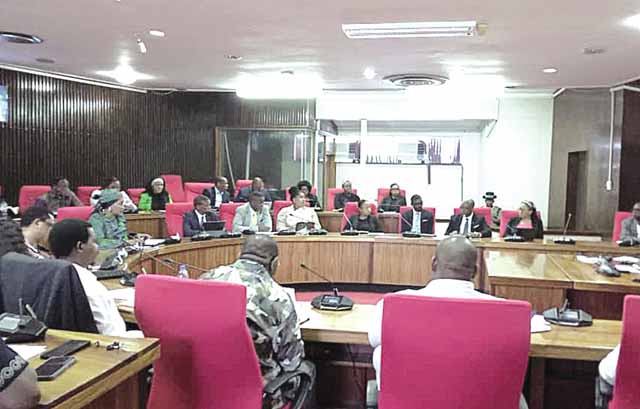By Sibusiso Dlamini | 2022-08-06
When I interviewed the Minister of Tourism and Environmental Affairs Moses Vilakati earlier this week, he expressed government’s intent to have the youth take the lead in the environmental protection movement in the country to bring into existence a culture of environmental stewardship in Eswatini.
“The ministry currently has various projects targeted at raising awareness on environmental issues lined-up, but my point is that all those efforts are futile without the youth’s purposeful involvement,” said Vilakati.
I listened carefully as he made his point and admittedly, couldn’t agree more with what he was saying.
Honestly, had it not been for the fact that I’m a natural sceptic to everything said by politicians or promises made by government; I probably would have been easily sold.
But, like most young people, I’ve grown to have a natural distrust for most government, especially when it comes to its so-called ‘youth programmes’ which ironically end achieving everything but the betterment of young people’s lives.
This is of course expected because government like most corporates and non-governmental organisations has for a very long time handled youth issues with a checkbox to meet funding criteria attitude, or as by-the-way Corporate Social Investment initiatives whose objective is projecting good imagery in annual reports and attracting positive media publicity.
Apart from those supposed youth initiatives many of the big corporates have ever so often, we have institutions in this country - funded by the tax-paying citizens, whose sole existence is to better the lives of young people, but somehow, they themselves do not have any young people making decisions or holding administrative roles.
danger
That right there is where we get it wrong from the start; it is where the danger is, as the tweeps would say, because not only does it guarantee failure from the word-go, but it also leads to a misuse of public funds, and worse, it is just the kind of pretence so insulting to turn even the most hopeful young person into a cynic.
It’s the point women have always emphasised; you cannot have anyone representing or making decisions for the oppressed but the oppressed themselves. Having a gem of 50 and 60-year olds converging in plush board-rooms, swinging in ergonomic office chairs and attending never-ending conferences with inflated organising costs, all in the name of ‘working for the betterment of the youth’s lives’ is not just point-blank fruitless, but regressive and tactlessly insincere.
It is the very reason why it will continue being almost impossible to get young people to care about the climate crisis chat, and is also what makes it hard for those young people who even care to try and pass on the message to their peers.
decision
“How can you expect me to possibly trust our decision-makers when every decision they make is motivated by greed and their insatiable thirst for power? ” said my neighbour, a computer programmer in his late 20s when I attempted making small-talk about the COP-27 summit to be held in Egypt later on this year.
“Also, I have other things to worry about than environment issues my brother; those are nice life problems to me, because anything they claim to be an initiative towards global warming and all is always just a money-making scheme for those involved,” he added, as we both laughed.
I changed the subject to soccer thereafter, which obviously lasted for way longer of course, but that conversation really stuck in my mind.
The thing is, as much as I very much relate to my neighbour’s sentiments, there is just something unnerving to me about not doing anything.
I mean, living as a young person and witnessing climate change directly affecting the lives of those around you is frightening to me, and distressing, which come to think of, has become the description of the life of a young person in this country.
But, albeit all that, the sad reality is that even though we (young people) may not be the ones responsible, we are still bound to bear the brunt of the consequences, so the truth is that doing nothing about it is shooting ourselves in the foot.
strides
Granted, with the help of its partners, government has made some strides in the attempt to incorporate all facets of society into the climate action; such as the formation of the country’s Nationally Determined Contributions (NDCs), however, we still cannot afford to ignore the glaring fact that there is still a long way to go.
For a start, it is important that youth engagement is decentralised.
Given the economic challenges of the youth in this country, government needs to ensure that it invests in information dissemination techniques that will not only be restricted to the urban areas.
This calls for working with the relevant stakeholders to ensure a timely and effective rollout of climate change awareness, hence my emphasis on the point of the need to work with young people to get them to develop the strategies and systems to execute this.
To young people; this is the time for us to show up for ourselves and our futures.
We did not create this mess, yes, but the sad reality which seems to be the norm in climate change world anyways is that will suffer without any consideration of our contribution to the source.
But as I mentioned, that’s just the unfairness that comes with the climate crisis, because even when you look at the fact that Eswatini’s share of global GHG emissions stands at only 0.01% according to statistics by the United Nations Development Programme (UNDP), but this does not mean mother earth has spared our tiny nation from droughts and hotter temperatures which have exacerbated hunger and propelled poverty.
idea
I can only hope that the recent catastrophes have given us enough of an idea as to how devastating and traumatic the effects of climate change can be, so it is on that note that I call upon the youth to be more proactive, more vocal and put more pressure on the government to act on the climate crisis by actually doing the little we can with the little resources we have without them.
For example, it would be a good first step to use the tools at our disposal, such as social media and influencers to learn and raise awareness about climate change, and how it affects each and every one of us in our daily lives. Let us have ‘climate change’ spaces and Instagram lives because that won’t only arm us with knowledge, but will also substantiate our case about the need to involve the youth in policy-making.
The 27th edition of the Conference of the Parties (COP-27) will be held in the continent this year (Egypt), so this is the time to be united and clear in our message, pertaining which agendas we would love to see pushed when countries congregate at Sharm el-Sheikh.
Personally, I think this year’s summit is an opportunity for young people to sit-down and push for the immediate stop to the clearly impractical demands for support for sustainable and climate-resilient development from the West.
role
Instead, we can look into the role we have played. The fact that destructive agricultural practices, urbanisation and infrastructure development are still continuing as if the climate change risk is fictional is absurd, and clearly points out that the responsibility lies with us as young people to evaluate and determine what role we and our communities can play in being drivers, collaborators and participants in systems designed to manage the impacts of climate change, as well as climate adaptation interventions.
As one to always choose to see the glass as half-full, I have always stressed the fact that as much as the effects of the climate crisis are negative, they also pretty much present an opportunity to generate revenue from curating new ways of how to live going forward.
The first step however is caring and really realising that, as minister Vilakati rightfully said, without our enthusiastic involvement, success in all of this country’s endeavours towards the environmental protection movement do not only become much more difficult, but impossible.
And sadly, the millions and millions of money spent on funding them will be poured down the drain.
share story
Post Your Comments Below
ATHLETICS - A true marathon indeed!
The High court has issued an order to Athletics Eswatini...
Over 2 000 interned paramedics are said to be unemployed 10 years after completing their training...

SOCCER - IN tatters!
All is not well at capital city giants Mbabane Highlanders' camp as a s...

CHIEFS in areas impacted by the Mkhondvo/Ngwavuma water augmentation programme phase 1B have aske...
All material © Swazi Observer. Material may not be published or reproduced in any form without prior written permission.
Design by Real Image Internet